冀教版九年级lesson 52,53导学案
- 格式:doc
- 大小:50.00 KB
- 文档页数:2

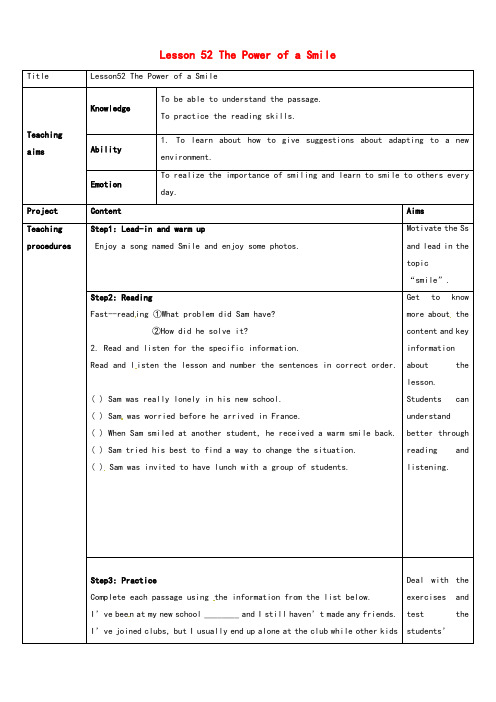
Lesson 52 The Power of a Smile Title Lesson52 The Power of a SmileTeaching aims KnowledgeTo be able to understand the passage.To practice the reading skills.Ability1. To learn about how to give suggestions about adapting to a newenvironment.EmotionTo realize the importance of smiling and learn to smile to others everyday.Project Content AimsTeaching procedures Step1: Lead-in and warm upEnjoy a song named Smile and enjoy some photos.Motivate the Ssand lead in thetopic“smile”. Step2: ReadingFast--reading ①What problem did Sam have?②How did he solve it?2. Read and listen for the specific information.Read and l isten the lesson and number the sentences in correct order.( ) Sam was really lonely in his new school.( ) Sam was worried before he arrived in France.( ) When Sam smiled at another student, he received a warm smile back.( ) Sam tried his best to find a way to change the situation.( ) Sam was invited to have lunch with a group of students.Get to knowmore about thecontent and keyinformationabout thelesson.Students canunderstandbetter throughreading andlistening.Step3: PracticeComplete each passage using the information from the list below.I’ve bee n at my n ew school ________ and I still haven’t made any frien ds.I’ve joined clubs, but I usually end up alone at the club while other kidsDeal with theexercises andtest thestudents’gather in small groups. I don’t know who to talk to or ________.This is the perfect question for me to answer because I have changed schools six times ________ and have had to make new friends each time! Yes, it’s always hard to make new friends in a new school because ________. Well, here’s how I usually do it —find a person ________. Start a conversation with that person. I find this works very well. Good luck!2. Extensive reading:①Read the passage and do the exercise.②Discuss : Why is smile important? mastery about the knowledge and make students understand the text better.Stu dents can get more information with extensive reading.3. Team work. Interview your group members!①Have you ever had to adapt to a new environment? How did you adapt to it? Interview your members.②Take a note on the card and give a report. Summarizethe expressions about how to adapt to a new environment. Practice talking about adapting to a new environment andlearn from each other.Step4 progress: Send your smiles!①A smile is one of the most powerful gifts that you can give to another Emotion promotion. Make studentsMake friendsCommunicate well SuggestionsSmile at othersA since primary schoolB for six weeksC who seems nice and friendlyD what to doE the students are a close groupperson.②Students make a smile card and send it to their classmates. learn to smile to others.Home- work 1. Read more passages about smile after class.2. Be a smiley person and give your smile to others every day!Board Design Lesson 52 The Power of a SmileTeamwork: How to ada pt to a new environment? Group1: smile at othersGroup2: make friendsGroup3: communicate wellGroup4: take part in group activities Group5:。
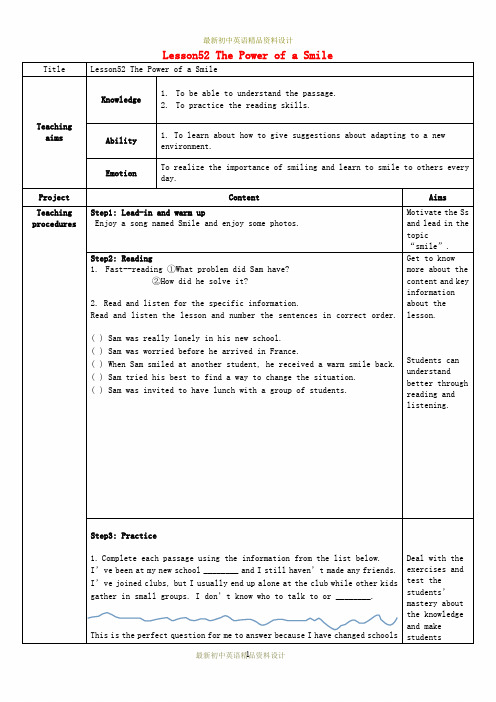
Lesson52 The Power of a Smile Title Lesson52 The Power of a SmileTeaching aims Knowledge1.To be able to understand the passage.2.To practice the reading skills.Ability1. To learn about how to give suggestions about adapting to a newenvironment.EmotionTo realize the importance of smiling and learn to smile to others everyday.Project Content AimsTeaching procedures Step1: Lead-in and warm upEnjoy a song named Smile and enjoy some photos.Motivate the Ssand lead in thetopic“smile”. Step2: Reading1.Fast--reading ①What problem did Sam have?②How did he solve it?2. Read and listen for the specific information.Read and listen the lesson and number the sentences in correct order.( ) Sam was really lonely in his new school.( ) Sam was worried before he arrived in France.( ) When Sam smiled at another student, he received a warm smile back.( ) Sam tried his best to find a way to change the situation.( ) Sam was invited to have lunch with a group of students.Get to knowmore about thecontent and keyinformationabout thelesson.Students canunderstandbetter throughreading andlistening.Step3: Practiceplete each passage using the information from the list below.I’ve been at my new school ________ and I still haven’t made any friend s.I’ve joined clubs, but I usually end up alone at the club while other kidsgather in small groups. I don’t know who to talk to or ________.This is the perfect question for me to answer because I have changed schoolsDeal with theexercises andtest thestudents’mastery aboutthe knowledgeand makestudentssix times ________ and have had t o make new friends each time! Yes, it’s always hard to make new friends in a new school because ________. Well, here’s how I usually do it —find a person ________. Start a conversation with that person. I find this works very well. Good luck!2. Extensive reading :①Read the passage and do the exercise.②Discuss : Why is smile important?understand the text better.Students can get more information with extensive reading.3. Team work. Interview your group members!①Have you ever had to adapt to a new environment? How did you adapt to it? Interview your members.②Take a note on the card and give a report.Summarize theexpressions about how toadapt to a newenvironment.Practice talking about adapting to anewenvironmentand learn from each other. Step4 progress: Send your smiles! ①A smile is one of the most powerful gifts that you can give to another person. ②Students make a smile card and send it to their classmates.Emotion promotion. Make students learn to smile to others.Make friendsTake part in group activitiesCommunicate well Suggestions Smile at others A since primary school B for six weeks C who seems nice and friendly D what to do E the students are a close groupHome- work 1. Read more passages about smile after class.2. Be a smiley person and give your smile to others every day!Board Design Lesson 52 The Power of a SmileTeamwork: How to adapt to a new environment? Group1: smile at othersGroup2: make friendsGroup3: communicate wellGroup4: take part in group activities Group5:。
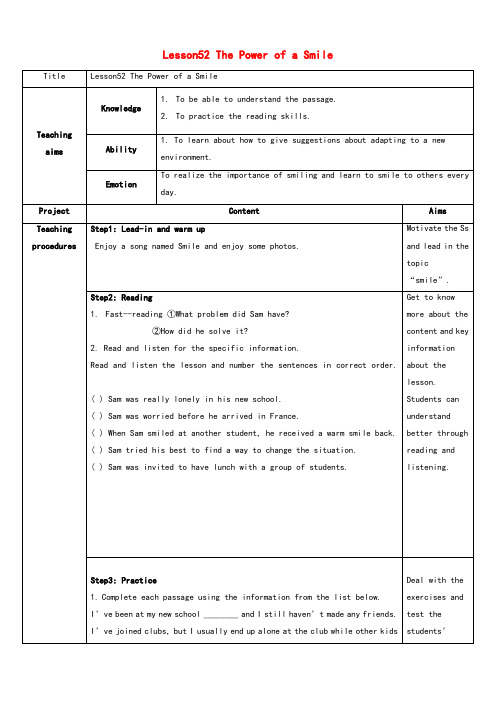
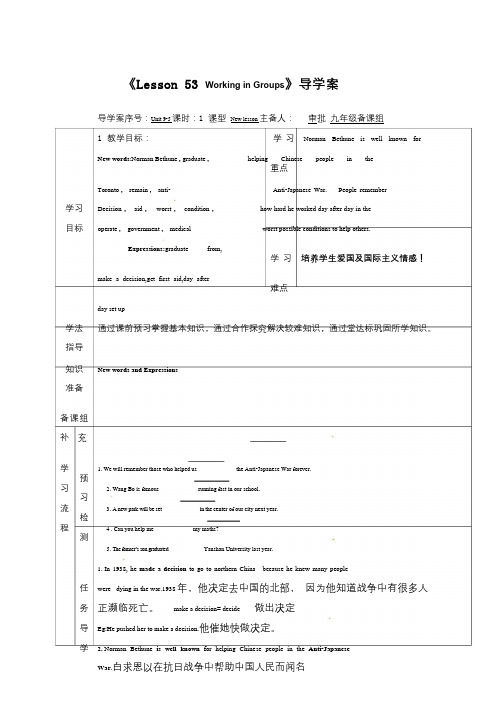
《Lesson 53 Working in Groups》导学案导学案序号:Unit 9-5 课时:1课型New lesson 主备人:审批九年级备课组1教学目标:学习Norman Bethune is well known forNew words:Norman Bethune,graduate,helping Chinese people in the重点Toronto,remain,anti- Anti-Japanese War. People remember学习Decision ,aid ,worst ,condition ,how hard he worked day after day in the目标operate,government,medical worst possible conditions to help others.Expressions:graduate from,学习培养学生爱国及国际主义情感!make a decision,get first aid,day after难点day set up学法通过课前预习掌握基本知识,通过合作探究解决较难知识,通过堂达标巩固所学知识。
指导知识New words and Expressions准备备课组补充学 1. We will remember those who helped us the Anti-Japanese War forever.预习 2. Wang Bo is famous running fast in our school.习流 3. A new park will be set in the center of our city next year.检程 4.C an you help me my maths?测5. The farmer’s son graduated Yanshan University last year.1. In 1938, he made a decision to go to northern China because he knew many people任were dying in the war.1938 年,他决定去中国的北部,因为他知道战争中有很多人务正濒临死亡。
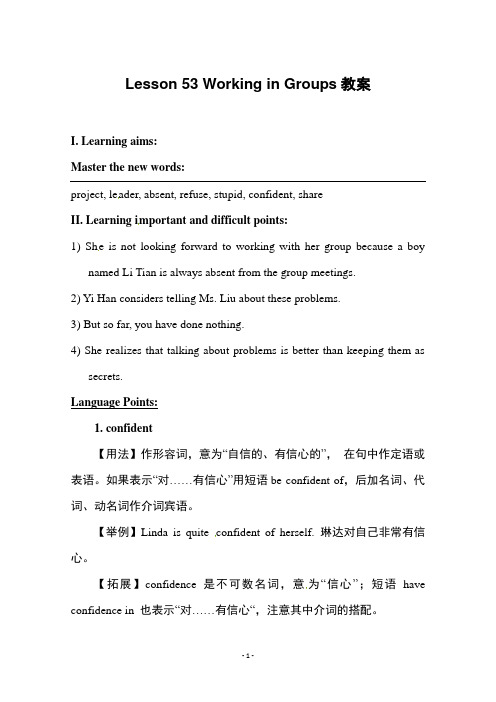
Lesson 53 Working in Groups教案I. Learning aims:Master the new words:project, leader, absent, refuse, stupid, confident, shareII. Learning important and difficult points:1) She is not looking forward to working with her group because a boynamed Li Tian is always absent from the group meetings.2) Yi Han considers telling Ms. Liu about these problems.3) But so far, you have done nothing.4) She realizes that talking about problems is better than keeping them assecrets.Language Points:1. confident【用法】作形容词,意为“自信的、有信心的”,在句中作定语或表语。
如果表示“对……有信心”用短语be confident of,后加名词、代词、动名词作介词宾语。
【举例】Linda is quite confident of herself. 琳达对自己非常有信心。
【拓展】confidence是不可数名词,意为“信心”;短语have confidence in 也表示“对……有信心“,注意其中介词的搭配。
【举例】We have confidence in this task. 我们对这次任务很有信心。
2. She is not looking forward to working with her group because a boy named Li Tian is always absent from the group meetings. 她不希望和她的小组一起工作因为一个叫李天的男孩总是在小组开会时缺席。
Lesson52学习目标:Master new words and expressions: difficulty,dining,Master known words and expressions : simply,somehow,重难点:Use the words and expressions properlyTalk about the power of a smileNew words1. difficulty( n.) - difficult(adj)* have difficulty (in) doing sth* have difficulty with sth* run into / meet with difficulties* go through / overcome difficulties1)He has difficulty in________ (与父母相处)2)The smart boy had no difficulty_________(解出这道数学题)3) whenever we have difficulty in our studies, teachers always help us patiently.4)He is brave enough_______________(克服许多困难)2.simple adj 简单的,朴素的simply adv. 仅仅,只,不过;简单地1)There's no _____solution to this problem.2)She is always in a________ yellow dress.3)Perhaps the person who wants to hang up simply doesn't want to talk any more. true→truly 真实地gentle→gently 温柔地;轻轻地simple→simply 简单地;terrible→terribly 可怕地possible→possibly 可能probable→probably 也许safelybravelypolitely3.Somehow adv. 无论如何,不管怎样;不知怎么的;以某种方式1)Somehow he had to adapt to this new environment.2)Somehow, he again made a mistake in solving the math problem.4. adapt v. 适应,改编adaptable adj.adapt to the new environmentadapt to the new changesadapt to the local customsadapt to the new situationadapt oneself to... 使(自己)适应be adapted from... 改编自,由... 改编for 为...改编1)Sam made a great effort __________ the new environment.2)The children find it hard_________ their new school.3)The movie was adapted ___a true story.5.dining n. 用餐dine v. diners n.1) We have to eat lunch in the dining hall.2) At that time, an old man among the diners called out the son and asked a question.6. a universal language___ useful magazine___ European country__ university__ umbrellaMain points1.This was the situation Sam faced each day as he went to class.as 作连词,表示“当……时候;随着You will grow wiser as you grow older.as 还可意为“因为;由于”Everyone likes him as he is kind and honest.as...as... 和……一样……This jacket is as new as yours.as...as possible=as...as one can/could意为“尽可能……,尽某人所能……”You should work as hard as possible.as soon as “一……就……”,I will tell you the truth as soon as you come back.as long as 意为“只要”,引导条件状语从句I will give the book to you as long as you get here on time.2.Before he arrived he knew there would be many difficulties. But they were even worse than he imagined.bad/badly/ill的比较级是worse,最高级是worst常用于修饰形容词或副词比较级的词有:两多(much, a lot),两少(a little, a bit),两甚至(even,still),相当远(rather, far)去了。
Unit 9 CommunicationLesson 52 The Power of a Smile1.Analysis of the StudentsThe students of Grade 9 have mastered certain vocabularies, expressi/ons and structures.They also have the abilitie/s of self-teaching and working in groups.Most of them are willing to express their opinions in English.2.Analysis of Teaching ContentLesson 52 is the fourth lesson in Unit 9, Book 5.This unit focus on the subject Communication.Students cares about the subject because it is close to everyone.Lesson 52 mainly talks about Sam’s life he moved to France.And he is really lonely at his new school.This lesson to learn about how to give suggestions about adapting to a new environment.1.To master the words : difficulty, dining, simply, somehow, adapt, universal.[来源:Z。
xx。
]2.To master the phrases: adapt to, join sb., (a) part of ….【能力目标】Improve the students’ability of speaking, listening, reading and writing.To learn about how to give suggestions about adapting to a new environment.【情感目标】To realize the importance of smiling and learn to smile to others.【教学重点】To master the words and phrases.【教学难点】To learn about how to give suggestions about adapting to a new environment.And can retell the lesson.Tape reco rder, MultimediaStep 1.Warm-upFree talk:(1) Show the pictures of smile and ask students: Can you smile?(2)Have you ever smiled today?Introduce Sam by his photo.1.Step2.Presentation2.Explain the words according to the pictures.3.Introduce Sam and guess: can he adapt French?4.Read the text as fast as you can, and get the right answers.(1)Did Sam meet any problems after he moved to France?(2)Did he choose to change the situation or give up?(3)Did he solve the problem?5.Check the answers.6.Explain the language points:part 或a part表示一部分。
Lesson 53 Working in Groups
Thinking(7:54-8:09) (10:14-10:29)
1.缺席;不出现
2.迄今
3.做分内工作4期望 5.从现在开始 6.遵守规则
7、拒绝做某事8.使某人陷入困境
Explanation(9min)
1.look forward to 盼望;期望(后接名词、代词或动名词)
Eg. 1)学生们正盼望着一个英语聚会。
The students are _____________________ an English party.
2)I’m always looking forward to ______ ( buy ) a new car .
3)I’m looking forward to_____ my parents soon .What about you ?A.seeing B.see C. saw D .seen 2.absent adj. 缺席的,不在的v.缺席,不参加
absence n. 缺席,不在Eg. 1) 今天有多少学生缺席?How many students are absent today ?
2)Li Ming was absent from school yesterday .昨天李明没来上学。
考点;be absent from 缺席
Our English teacher is never _____(缺席)from his class 。
3.考点;1)get sb. in trouble 让某人陷入困境中。
2)give sb. trouble 给某人造成麻烦。
3)be in trouble 处于困境中。
4)have trouble (in) doing sth.做某事有困难。
5)trouble v.使烦恼;麻烦Eg. 1)不要让这个害羞的男孩陷入困境。
Don’t ____ the shy boy _____.
2)I am sorry to ____(麻烦)you,but could absen you tell me where the city hall is?
3) The girl has trouble in ______( learn )English .
4.so far 到目前为止;迄今=up to now/ until now (常用于句首或句末,现在完成时的标志)Eg. ________ I haven’t got any help from him.迄今,我还没有得到过他的任何
1look forward to 盼望;期望(后接名词、代词或动名词)
2.absent adj. 缺席的,不在的v.缺席,不参加absence n. 缺席,不在
3..考点;1)get sb. in trouble 让某人陷入困境中。
2)give sb. trouble 给某人造成麻烦。
3)be in trouble 处于困境中。
4)have trouble (in) doing sth.做某事有困难。
5)trouble v.使烦恼;麻烦
1.I am looking forward to_______( hear) from you .
2.---So far,how long ____ you_____China ? -----For one year.
A.have ;come
B.have ;been to
C.have ;been in
D.have ;gone to
3.From now on they ______( get on )very well.
Lessen54 How Embarrassing!
Thinking(7:54-8:09) (10:14-10:29)
1.偶然遇到
2.弄清楚
3.相似的经历
4. 回到中国
5. 提醒王梅她的名字
6.收到······来信(电话)
10:47-56)ex planation(9min)
1.seem可用作连系动词或不及物动词,意为“似乎;好像”,其常见用法现归纳如下:
一、“主语+ seem +(to be )+表语”,表语多为名词或形容词,有时是其他的词或短语,以说明主语的特征或状态。
例如:Tom seems (to be )a very clever boy. 汤姆看上去是一个非常聪明的男孩。
二、“主语+ seem + 不定式”,此句型中的seem与不定式一起构成复合谓语。
例如:The children seemed to be eating something in the room. 孩子们好像正在房间里吃东西呢
三、“It seems + that从句”,其中it 是形式主语,that引导主语从句。
例如:It seems to me that Mr Brown will not come again. 在我看来布朗先生不会再来了。
2.remind 提醒
①remind sb. of / about sth. 提醒某人某物;提醒某人注意某事Be sure to remind her of the meeting she has to attend. 务必提醒她要参加那次会议。
②remind sb. to do sth. 提醒某人做某事Please remind me to post the letter. 请提醒我寄那封信。
③remind sb. that-clause 提醒某人…… She reminded me that I hadn't written to mother. 她提醒了我,我还没给妈妈写信。
【练习试题】what you said just now ____ me of that American professor.
A. mentioned
B. informed
C. reminded
D. memorized
3. admit sth. 承认某事。
eg:He refused to admit the turth.(翻译)
admit doing sth. 承认做过某事。
He admited breaking the window.
admit to sth. (常指勉强) 承认Don't be afraid to admit to your mistakes.
admit (to sb.) that... (向某人) 承认...I admit that I was wrong.
1.The teacher reminded us ________in our homework on time.
A. hand
B. to hand
C.handing
D.handing
2.The book ______by Lu Xun is liked by all of the students.
A. wrote
B.written
C.was written
D.writing
3.I was ________at the ______moment.
A. embarrassing embarrass
B. embarrass embarrassing
C. embarrassed embarrassing D embarrassing embarrassed
4.Would you mind turning up the music ?_________. Dad is sleeping now.
A.Sorry, I can't do it
B.OK, I'll do it
C.No, not at all.
D. Yes, please.
5.He was familiar ______ the animals. That means these animals
were familiar ______ him.
A. to with
B.with to
C.to to
D.with with
6.what ,can, he, imagine, you, doing, is (?)_________________________________________
7.seemed, had, it, what , that, nobody, knew,happened ____________________________________
8. shy, in, she, so, speak, was, that, public,girl, couldn't, the___________________________________。